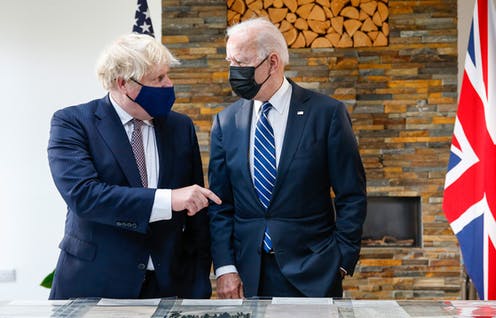Franklin Roosevelt and Winston Churchill first met in the summer of 1941 on HMS Prince of Wales to create the Atlantic Charter, establishing the terms of their countries’ relationship in war, and, as it was to prove, in peace.
Eighty years later, Joe Biden and Boris Johnson meet in front of a new HMS Prince of Wales to renew the constitution of the “special relationship”, with the New Atlantic Charter. These are about as piquant a series of historical coincidences as an administration (or historian) could wish for.
Both charters commit the US and the UK to what they deem the pressing issues of the day. The original’s call for the lowering of trade barriers, self-determination, and economic cooperation remains not only pertinent, but crucial, both for a post-Brexit, “global” Britain, and for an America which wants once again to lead through alliances.
In an age when the world is actually becoming less democratic, the new accord makes paramount the defence of democracy, followed by strengthening international institutions, recognising sovereignty and territorial integrity, supporting collective security, and a rules-based global economy. It ends with tackling the climate crisis – a notion unknown in 1941 – and, topically, the catastrophic impact of health crises.
Where once there was war, now there is pandemic. Both Biden and Johnson have announced plans to collectively vaccinate 600 million people through another legacy of 1941, the World Health Organization. The leaders of the two countries which led the fightback in the second world war may think of themselves as leading the world again, but against a different kind of tyranny.
Historic echoes
Five months after Roosevelt and Churchill met, the Japanese bombed Pearl Harbour and delivered what the prime minister wanted most: America in the war. Two days later, the Japanese sank the HMS Prince of Wales and another experience was shared.
On the eve of his departure, Biden noted his intention to “affirm the special relationship between our nations”. This set up Johnson’s revelation that he didn’t like the term, saying he thought it was “needy and weak”. To freshen it up, he renamed it the “indestructable relationship”. This isn’t the first attempt to revamp it.
For example, it’s not uncommon for the US and UK to publicly mark anniversaries of the furniture of the special relationship: the NSA and GCHQ marked 75 years of their intelligence partnership while the US has celebrated how Churchill coined the term.. Churchill happens to be the Brit most revered by Americans – to the extent of having a warship named after him.
And this week, the 21st century may be seen to look back to the 20th. There’s even a biographical relationship: President Biden is as old as the Atlantic Charter. And he became a senator in 1973, the year that Britain pivoted from the new world back to the old. After the G7, Biden and Johnson will go on to NATO – yet another legacy of 1941 (as are the summits themselves).
A changing relationship
The precedents for the two men alone are auspicious. Biden-Johnson succeeds Trump-May and Trump-Johnson, respectively the worst, and the most dysfunctional presidential and prime ministerial relationships in history.
Neither having much in the way of fixed beliefs, for Trump and Johnson the personal had primacy. The preoccupation with their personalities and idiosyncrasies overwhelmed other aspects of US-UK relations.
Nevertheless, Biden – the most career of career politicians – and Johnson – whose non-conformity is central to his appeal – find their relationship more than usually freighted with baggage.
Overtly Irish-American, Biden publicly voiced his concerns about the implications of Brexit trade issues on peace in Northern Ireland.
Johnson’s reckless remark about Obama the Kenyan “has never gone away”. According to a member of Biden’s campaign team: “Biden’s got a long memory and Boris is not in his good books. Biden and Obama are like family.”
Equally unwisely, Biden described the new prime minister as a “kind of a physical and emotional clone” of Trump. Such antipathy stemmed from both the pro-Trump present and the anti-Obama past of the prime minister.
But ascending to office can do wonders to opinions. Biden appropriated Johnson’s slogan about the impending post-pandemic reconstruction: “Build Back Better”, while Johnson immediately welcomed the “incoming Biden-Harris administration” and spoke of “the previous president” without Trump’s name passing his lips.
With Biden’s election, in London and Washington the commentators’ word of choice for US-UK relations was “reset”. With Biden’s record of pragmatism and cooperation and the fortuitous coincidence of UK leadership of the UN Security Council – the core of the 1941 settlement –- as well as the G7 and COP26, an opportunity presented itself.
Scepticism will persist about the nature and extent – even the existence – of the special relationship. But the first world leader the new American president spoke to (other than those of the two countries bordering his own) was British, the first he met in person was British and the first country he visited as president was Britain.
And when they met, the president and the prime minister chose to retell the origin story of the special relationship.



 India–U.S. Interim Trade Pact Cuts Auto Tariffs but Leaves Tesla Out
India–U.S. Interim Trade Pact Cuts Auto Tariffs but Leaves Tesla Out  Trump’s Inflation Claims Clash With Voters’ Cost-of-Living Reality
Trump’s Inflation Claims Clash With Voters’ Cost-of-Living Reality  TrumpRx Website Launches to Offer Discounted Prescription Drugs for Cash-Paying Americans
TrumpRx Website Launches to Offer Discounted Prescription Drugs for Cash-Paying Americans  Trump Allegedly Sought Airport, Penn Station Renaming in Exchange for Hudson River Tunnel Funding
Trump Allegedly Sought Airport, Penn Station Renaming in Exchange for Hudson River Tunnel Funding  Trump Backs Nexstar–Tegna Merger Amid Shifting U.S. Media Landscape
Trump Backs Nexstar–Tegna Merger Amid Shifting U.S. Media Landscape  TrumpRx.gov Highlights GLP-1 Drug Discounts but Offers Limited Savings for Most Americans
TrumpRx.gov Highlights GLP-1 Drug Discounts but Offers Limited Savings for Most Americans  China Warns US Arms Sales to Taiwan Could Disrupt Trump’s Planned Visit
China Warns US Arms Sales to Taiwan Could Disrupt Trump’s Planned Visit  Nighttime Shelling Causes Serious Damage in Russia’s Belgorod Region Near Ukraine Border
Nighttime Shelling Causes Serious Damage in Russia’s Belgorod Region Near Ukraine Border  Trump Endorses Japan’s Sanae Takaichi Ahead of Crucial Election Amid Market and China Tensions
Trump Endorses Japan’s Sanae Takaichi Ahead of Crucial Election Amid Market and China Tensions  U.S. Lawmakers to Review Unredacted Jeffrey Epstein DOJ Files Starting Monday
U.S. Lawmakers to Review Unredacted Jeffrey Epstein DOJ Files Starting Monday  U.S. to Begin Paying UN Dues as Financial Crisis Spurs Push for Reforms
U.S. to Begin Paying UN Dues as Financial Crisis Spurs Push for Reforms  Pentagon Ends Military Education Programs With Harvard University
Pentagon Ends Military Education Programs With Harvard University  Ohio Man Indicted for Alleged Threat Against Vice President JD Vance, Faces Additional Federal Charges
Ohio Man Indicted for Alleged Threat Against Vice President JD Vance, Faces Additional Federal Charges  Missouri Judge Dismisses Lawsuit Challenging Starbucks’ Diversity and Inclusion Policies
Missouri Judge Dismisses Lawsuit Challenging Starbucks’ Diversity and Inclusion Policies  Trump Says “Very Good Talks” Underway on Russia-Ukraine War as Peace Efforts Continue
Trump Says “Very Good Talks” Underway on Russia-Ukraine War as Peace Efforts Continue  Netanyahu to Meet Trump in Washington as Iran Nuclear Talks Intensify
Netanyahu to Meet Trump in Washington as Iran Nuclear Talks Intensify 

































